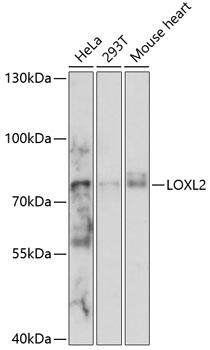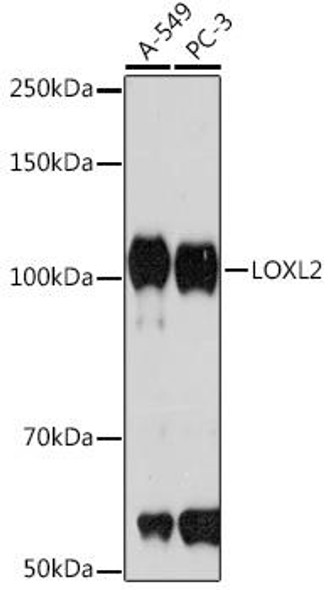Epigenetics & Nuclear Signaling Antibodies 3
Anti-LOXL2 Antibody (CAB14638)
- SKU:
- CAB14638
- Product Type:
- Antibody
- Reactivity:
- Human
- Reactivity:
- Mouse
- Host Species:
- Rabbit
- Isotype:
- IgG
- Antibody Type:
- Polyclonal Antibody
- Research Area:
- Epigenetics and Nuclear Signaling
Description
| Antibody Name: | Anti-LOXL2 Antibody |
| Antibody SKU: | CAB14638 |
| Antibody Size: | 20uL, 50uL, 100uL |
| Application: | WB |
| Reactivity: | Human, Mouse |
| Host Species: | Rabbit |
| Immunogen: | Recombinant fusion protein containing a sequence corresponding to amino acids 505-774 of human LOXL2 (NP_002309.1). |
| Application: | WB |
| Recommended Dilution: | WB 1:500 - 1:2000 |
| Reactivity: | Human, Mouse |
| Positive Samples: | HeLa, 293T, Mouse heart |
| Immunogen: | Recombinant fusion protein containing a sequence corresponding to amino acids 505-774 of human LOXL2 (NP_002309.1). |
| Purification Method: | Affinity purification |
| Storage Buffer: | Store at -20'C. Avoid freeze / thaw cycles. Buffer: PBS with 0.02% sodium azide, 50% glycerol, pH7.3. |
| Isotype: | IgG |
| Sequence: | VMSG VKCS GTEL SLAH CRHD GEDV ACPQ GGVQ YGAG VACS ETAP DLVL NAEM VQQT TYLE DRPM FMLQ CAME ENCL SASA AQTD PTTG YRRL LRFS SQIH NNGQ SDFR PKNG RHAW IWHD CHRH YHSM EVFT HYDL LNLN GTKV AEGH KASF CLED TECE GDIQ KNYE CANF GDQG ITMG CWDM YRHD IDCQ WVDI TDVP PGDY LFQV VINP NFEV AESD YSNN IMKC RSRY DGHR IWMY NCHI GGSF SEET EKKF EHFS GLLN NQLS PQ |
| Gene ID: | 4017 |
| Uniprot: | Q9Y4K0 |
| Cellular Location: | Chromosome, Nucleus, Secreted, basement membrane, extracellular matrix, extracellular space |
| Calculated MW: | 86kDa |
| Observed MW: | 87kDa |
| Synonyms: | LOXL2, LOR, LOR2, WS9-14 |
| Background: | This gene encodes a member of the lysyl oxidase gene family. The prototypic member of the family is essential to the biogenesis of connective tissue, encoding an extracellular copper-dependent amine oxidase that catalyses the first step in the formation of crosslinks in collagens and elastin. A highly conserved amino acid sequence at the C-terminus end appears to be sufficient for amine oxidase activity, suggesting that each family member may retain this function. The N-terminus is poorly conserved and may impart additional roles in developmental regulation, senescence, tumor suppression, cell growth control, and chemotaxis to each member of the family. |
| UniProt Protein Function: | LOXL2: Mediates the post-translational oxidative deamination of lysine residues on target proteins leading to the formation of deaminated lysine (allysine). When secreted in extracellular matrix, promotes cross-linking of extracellular matrix proteins by mediating oxidative deamination of peptidyl lysine residues in precursors to fibrous collagen and elastin. Acts as a regulator of sprouting angiogenesis, probably via collagen IV scaffolding. When nuclear, acts as a transcription corepressor and specifically mediates deamination of trimethylated 'Lys-4' of histone H3 (H3K4me3), a specific tag for epigenetic transcriptional activation. Involved in epithelial to mesenchymal transition (EMT) via interaction with SNAI1 and participates in repression of E- cadherin, probably by mediating deamination of histone H3. Also involved in E-cadherin repression following hypoxia, a hallmark of epithelial to mesenchymal transition believed to amplify tumor aggressiveness, suggesting that it may play a role in tumor progression. Acts as a regulator of chondrocyte differentiation, probably by regulating expression of factors that control chondrocyte differentiation. Belongs to the lysyl oxidase family. |
| UniProt Protein Details: | Protein type:Oxidoreductase; Secreted; Cell adhesion; Secreted, signal peptide; EC 1.4.3.13 Chromosomal Location of Human Ortholog: 8p21.3 Cellular Component: basement membrane; extracellular space; nucleoplasm; nucleus Molecular Function:chromatin binding; electron carrier activity; methylated histone residue binding; protein binding; protein-lysine 6-oxidase activity; transcription corepressor activity Biological Process: aging; cell adhesion; collagen fibril organization; endothelial cell migration; endothelial cell proliferation; epithelial to mesenchymal transition; histone modification; negative regulation of transcription, DNA-dependent; positive regulation of chondrocyte differentiation; protein amino acid deamination; protein modification process; response to copper ion; response to hypoxia; sprouting angiogenesis |
| NCBI Summary: | This gene encodes a member of the lysyl oxidase gene family. The prototypic member of the family is essential to the biogenesis of connective tissue, encoding an extracellular copper-dependent amine oxidase that catalyses the first step in the formation of crosslinks in collagens and elastin. A highly conserved amino acid sequence at the C-terminus end appears to be sufficient for amine oxidase activity, suggesting that each family member may retain this function. The N-terminus is poorly conserved and may impart additional roles in developmental regulation, senescence, tumor suppression, cell growth control, and chemotaxis to each member of the family. [provided by RefSeq, Jul 2008] |
| UniProt Code: | Q9Y4K0 |
| NCBI GenInfo Identifier: | 13878585 |
| NCBI Gene ID: | 4017 |
| NCBI Accession: | Q9Y4K0.1 |
| UniProt Secondary Accession: | Q9Y4K0,Q53HV3, Q9BW70, Q9Y5Y8, B2R5Q0, |
| UniProt Related Accession: | Q9Y4K0 |
| Molecular Weight: | 86,725 Da |
| NCBI Full Name: | Lysyl oxidase homolog 2 |
| NCBI Synonym Full Names: | lysyl oxidase like 2 |
| NCBI Official Symbol: | LOXL2 |
| NCBI Official Synonym Symbols: | LOR2; WS9-14 |
| NCBI Protein Information: | lysyl oxidase homolog 2 |
| UniProt Protein Name: | Lysyl oxidase homolog 2 |
| UniProt Synonym Protein Names: | Lysyl oxidase-like protein 2; Lysyl oxidase-related protein 2; Lysyl oxidase-related protein WS9-14 |
| Protein Family: | Lysyl oxidase |
| UniProt Gene Name: | LOXL2 |
| UniProt Entry Name: | LOXL2_HUMAN |







